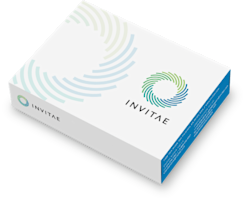
Invitae Alpha Thalassemia X-linked Intellectual Disability Test
Test code: 04721 •
Test description
This test analyzes the ATRX gene, which is associated with alpha thalassemia X-linked intellectual disability syndrome (ATRX). ATRX is characterized by distinctive facial features, severe developmental delays, genital anomalies, intellectual disability, and abnormal hemoglobin H production.
Genetic testing of this gene may confirm a diagnosis and help guide treatment and management decisions. Identification of a disease-causing variant would also guide testing and diagnosis of at-risk relatives.
Ordering information
Turnaround time:
10–21 calendar days (14 days on average)New York approved:
YesPreferred specimen:
3mL whole blood in a purple-top EDTA tube (K2EDTA or K3EDTA)Alternate specimens:
Saliva, buccal swab, and gDNA are also accepted.Learn more about specimen requirementsRequest a specimen collection kitClinical description and sensitivity
Clinical description:
ATRX is a rare form of intellectual disability that is characterized by distinctive facial features including telecanthus, short nose, tented vermilion of the upper lip, and thick or everted vermilion of the lower lip with coarsening of the facial features over time. Genital anomalies including hypospadias and undescended testes, ambiguous genitalia, and normal external female genitalia in a 46,XY individual have also been reported. Skeletal findings include short stature, brachydactyly, tapering fingers, clinodactyly, digital contractures, overlapping digits, pes planus, varus and valgus foot deformations, pectus carinatum, kyphosis, scoliosis, and dimpling over the lower spine. Additionally profound developmental delay is a common feature. Although anemia manifestations characteristic of alpha-thalassemia may be observed, many individuals with ATRX syndrome have normal hematological findings and show no signs of thalassemia.
Assay information
Invitae is a College of American Pathologists (CAP)-accredited and Clinical Laboratory Improvement Amendments (CLIA)-certified clinical diagnostic laboratory performing full-gene sequencing and deletion/duplication analysis using next-generation sequencing technology (NGS).
Our sequence analysis covers clinically important regions of each gene, including coding exons and 10 to 20 base pairs of adjacent intronic sequence on either side of the coding exons in the transcript listed below, depending on the specific gene or test. In addition, the analysis covers select non-coding variants. Any variants that fall outside these regions are not analyzed. Any limitations in the analysis of these genes will be listed on the report. Contact client services with any questions.
Based on validation study results, this assay achieves >99% analytical sensitivity and specificity for single nucleotide variants, insertions and deletions <15bp in length, and exon-level deletions and duplications. Invitae's methods also detect insertions and deletions larger than 15bp but smaller than a full exon but sensitivity for these may be marginally reduced. Invitae’s deletion/duplication analysis determines copy number at a single exon resolution at virtually all targeted exons. However, in rare situations, single-exon copy number events may not be analyzed due to inherent sequence properties or isolated reduction in data quality. Certain types of variants, such as structural rearrangements (e.g. inversions, gene conversion events, translocations, etc.) or variants embedded in sequence with complex architecture (e.g. short tandem repeats or segmental duplications), may not be detected. Additionally, it may not be possible to fully resolve certain details about variants, such as mosaicism, phasing, or mapping ambiguity. Unless explicitly guaranteed, sequence changes in the promoter, non-coding exons, and other non-coding regions are not covered by this assay. Please consult the test definition on our website for details regarding regions or types of variants that are covered or excluded for this test. This report reflects the analysis of an extracted genomic DNA sample. In very rare cases, (circulating hematolymphoid neoplasm, bone marrow transplant, recent blood transfusion) the analyzed DNA may not represent the patient's constitutional genome.
You can customize this test by clicking genes to remove them.
Primary panel
Question about billing?
Find answers